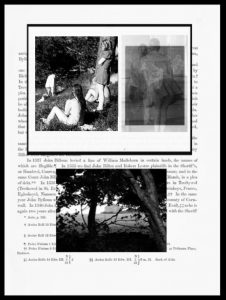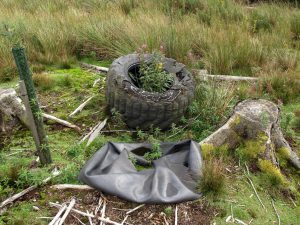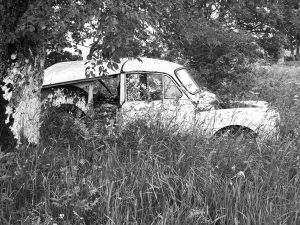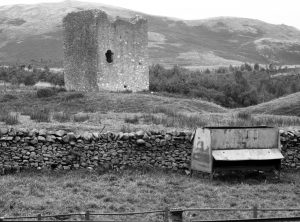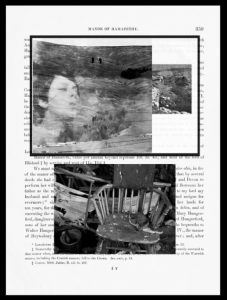Mike and Patsy Scott
Mike was the first boy who spoke to me when I arrived in the valley. I’d been nervously chatting to his sister Patsy while I waited for Dad outside the Post Office. Mike had joined us, a tall, handsome, thickset lad with pale skin and ginger hair who asked simple, direct questions. After that I’d often speak to him briefly, at school or when he was in the village running errands for their aunt. Initially Mike disconcerted me simply because I was thrown by being asked a direct question by a boy. This never bothered him. Perhaps the third or fourth time we spoke, the issue of freckles came up for some reason. He proceeded to tell me proudly he had far fewer than Patsy and that his didn’t cover him ‘absolutely everywhere’ like hers did. ‘Just like spots on a leopard’. As an only and rather sheltered child, I was shocked and fascinated by the fact that he knew his sister had freckles ‘absolutely everywhere’. This added to my being disconcerted around Mike but, like everyone else, I was impressed by him, something he simply took as his due.
Later I discovered from Patsy that he was notorious among the boys for stuff we girls weren’t supposed to know about. Like having the biggest ‘thing’ and being able to pee highest up the wall in the boys’ toilet. (The first I confirmed for myself when, much later, we all went skinny-dipping, along with the accuracy of Mike’s claim about the extent of Patsy’s freckles). Later Cat and I would try hard to pretend we despised boys like Mike because they intimidated us. But we liked Patsy and so, by default, rather admired Mike because he looked after her at school in a way other brothers simply didn’t bother to do.
Apart perhaps for the leopard freckles, there was nothing remotely feline about Patsy. Small, plump, and blond, with a pretty, almond-shaped face, she had a slightly impish air that sometimes got her into trouble for things she hadn’t actually done. When that happened she would blush furiously and start to stutter slightly, which she never normally did. As Mike’s little sister she escaped most of the teasing and horseplay inflicted on younger girls by the older primary boys. Nobody in their right mind would risk antagonising Patsy’s big brother. (Mike was in fact slow to anger but terrifying when roused.) Patsy’s immunity from these daily irritations could be irritating to those of us less fortunately connected, but we overlooked that because of Mike’s genial attitude to Patsy’s female friends. But looking back now, it’s perhaps little wonder Patsy’s emotional life turned out to be complicated, given that for years her identity was inseparable from her brother’s status as ‘dominant male’.
Mike and Patsy stayed on the edge of the group, partly because as orphans they were very close, partly because they lived with an aunt who ran stables and so got more chores to do than Cat, Hamish, or me. But they were still our good friends. Mike was essentially a gentle soul but, because he was never entirely comfortable indoors, seemed rougher than he was. He’d been taught early on how to handle a shotgun by a retired keeper and was a better shot than either Peter or James. Sir William had never bothered to teach the twins to shoot, offhandedly telling the keepers to give them lessons when they could. Inevitably these, when they happened, were
By the road to Langleeford.
somewhat perfunctory. When their father suddenly announced that the twins must now keep the pigeons and rabbits down in the fields near the Big House, it was Mike who helped them master the necessary skills. He encouraged them to borrow the clay pigeon trap and directing their practice. At one point, he even tried to teach us girls to shoot too. Lizzy hated guns, but he started the rest of us off trying to shoot cans off a wall with an air rifle. We were supposed to progress to spuggies but only Kate ever got the hang of the rifle and even she never hit a spuggy.
Initially, although I liked Patsy, I somehow assumed she was included in the group just because she tagged along with Mike. I was quite wrong. The older ones genuinely liked her, not because she was Mike’s sister, but because she was generous with her time and affection. Later she would patiently negotiate with her aunt so that Cat, Hamish, and I could sometimes borrow ponies to ride with the others in return for helping with stable chores.
Patsy and Mike had lost their parents when they were very young and were adopted by a somewhat eccentric aunt. She ensured they were clean and fed, but when Patsy was old enough expected her to take on much of the housekeeping. The aunt’s great passions in life were ponies and the beautiful brindled whippets she bred to show standards. Patsy took it upon herself to provide her older brother with something like maternal support. She was always genuinely concerned for his welfare and clearly took great pride in his various achievements. I came to see her as more grown-up than me in many ways and sometimes to wish I too had a brother to care for.
First car
The other boys (Peter, James, and Hamish)
Oddly, and almost from the start, I felt I knew just where I was with Mike; but it took me a long time to feel I knew where I was with the other three boys, particularly James.
Only a boy, and probably only James, could have used the phrase: ‘hell is other peoples’ families’ (to response to something Hamish’s father had said or done). James smoked French cigarettes when he could and had obviously dipped into Sartre at some point. A good deal more extrovert than his twin, he set the benchmark for our musical tastes and could be relied on to pronounce on anything else cultural that appeared on our radar. He was younger than Peter by a bare five minutes and, perhaps because of this, was always anxious to demonstrate his superior knowledge of the wider world. He could be rather dogmatic and dismissive, particularly with us younger girls, but he was also strikingly good-looking and could be very charming when he chose to be. In all this he rather took after his father. But he also had an unexpectedly thoughtful, even sensitive, side that kept him from developing the untouchable self-confidence and sense of entitlement so obnoxiousin Sir William. Peter was physically and temperamentally more solid, quieter and plainer-mannered than his twin, less strikingly handsome, and with his mother’s darker complexion, high cheekbones, and rather disconcerting sense of humour. Normally serious, he would sometimes make deadpan but very funny observations when you least expected them. To begin with I had trouble telling whether he meant to be funny or not, since he always kept an absolutely straight face when he did this.
Apart from Kate, who once or twice quoted it sarcastically against him, we girls didn’t use James’s phrase. Personally, I felt that whatever hell was probably had more to do with the absence of families than their presence, and I knew Patsy would feel the same. But I wasn’t really sure what James intended by the phrase and I certainly wasn’t going to ask. Why risk feeling more stupid around him than I often did. I think it unsettled me because it appeared about the time the question of boysas boysreally came up for me, prompted in no small part by Cat’s kissing Mike. I felt I didn’t really know what proper families, made up of people like Hamish with a mother and father, were like. But I was starting to like Hamish, so I wondered about it. We’d always got on well enough, but now we started going in for affectionate pushing and shoving like the boys at school. I wouldn’t have dreamed of doing that with any of the others and, while I was wondering why, I found myself talking with Hamish on a regular basis.
Hamish was a little taller than me, thin (like me), usually quiet (unlike me), had blue-green eyes, and lots of lovely, fine black hair that flopped down over his narrow face. Because he’d been seriously ill when he was little he had to take pills regularly and was sometimes unwell for up to a week at a time. As a result he tended to be a bit on the edge of things. In the last year at primary I used to talk to him during break, about books we were reading or how things were at home. Although his mum was nice, we all disliked his father because of his sermons. Hamish told me one day that his father wasn’t kind to his mother. He looked at his shoes when he said it and I thought from his voice that maybe he was going to cry. Instead he swallowed and said he felt that he didn’t have a proper father. I said I didn’t have a mum, so maybe that made us similar. He seemed to agree and, despite our later going to separate schools, we kept talking. Hamish fascinated me because he loved reading and writing and spent hours with books his parents had inherited but has father had no time for. Peter, Lizzy and James were, in their different but conventional ways, quite ‘bookish’. Peter and Lizzy because they were interested in natural and human history, particularly in relation to our region, and James because he liked playing with ideas, which he treated like fireworks to entertain and dazzle. But Hamish’s bookishness was different.
I sensed he loved the sound of words and, while he admitted to me that he wrote stories and poems, he made me promise not to tell the others and would never let me read any of them. His fatherwas dismissive of ‘intellectuals’ and ‘arty’ people, but had inherited a considerable family library, later augmented by the more valueable first edition books in his father-in-law’s collection. I sense that he saw this library as both a tangable sign of his own authority and a vague threat to a properly Christian life. Hamish, hoever, secretly plundered this library and got drunk on its contents. When he talked about his secret raids to obtain reading matter, I felt I was listening to some brave and intreped explorer. I became intoxicated by proxy. Hamish dipped into everything from early Ninteenth Century theological tracts and the works of Sidney and Beatrice Webb, to Dickens andthe plays of George Bernard Shaw. His most treasured discovery, however, was: ‘Des Imagistes: An Anthology’, edited by Ezra Pound. There he had found poems by, if I remember right, people like Amy Lowell, William Carlos Williams, James Joyce, D. H. Lawrence and H. D.
I became caught up in Hamish’s intoxication by accident. He had found me in tears on the stairs at Homehaugh and asked if I was alright. Ashamed, I explain I’d just read Charles Hamilton Sorley’s ‘When you see millions of the mouthless dead’ for a school project. My tears over a poem led to his confiding in me. It was the first time I’d seen Hamish really animated about anything and had a powerful effect on me. Later, after he’d admitted that he wrote poems, he told me shyly that I was his muse. As often happened in conversations with Hamish, I wasn’t sure what the word meant and had to look it up later in the old encyclopedia at home. Along with the dry-as-dust definition there was a little faded picture of nine women, some with their breasts showing. I was puzzled, having no breasts to speak of at that point, but also obscurely flattered.
Hamish’s passion changed our friendship by initiating a tentative connection between a shared life of the mind and a desire for creative work. His passion gradually fire up my own creative interests. The contents of his enthusiasms, which often left me secretly struggling, mattered far less than the intensity with which this normally near-silent boy pursued them. Initially I found this disconcerting, but slowly I found my way to safer ground. I realized that there were other things about Hamish, his way of holding his head, his quiet determination, and his lovely black hair, that were hppily familiar. He reminded me of one of my beloved rooks. I increasingly found myself always on the lookout for him and, when he was there, wanting him to notice me too. Having listened to Kate and older girls at school, I adopted a word they used to name my own uncertain feelings. I decided that I ‘fancied’ Hamish. I then set about trying to ensure that, muse or not, he would fancy me. In short I was out of my depth and, understandably enough, traded the disturbing mystery of a shared interest in the informed creative life for the safer ground of a schoolgirl crush.
‘The tower struck by lightening’.
I became increasingly fascinated by Hamish. For example, although he and Mike were in many ways opposites, they got on really well. He was also disconcertingly perceptive. For example he noticed that, while Peter always acted older than he was and so appeared our natural if unofficial, leader, it was actually Lizzy who did most of the leading. Hamish said it was almost as if they had some kind of pact about it. When he’d pointed this out it seemed so obvious, but had never occurred to me before.
Locally everyone knew that Peter was ‘a steady lad’, and James wasn’t, having inherited his father’s temper along with his charm. Hamish and I agreed that people usually noticed James first and agreed that, although we admired him, we felt he was unpredictable and so a bit scary. We also noticed the way he would play up to Lizzy, deliberately siding with her in any small disagreement between her and Peter, who sometimes assumed too much just because he was older. But, as Cat and I soon discovered, while Peter might be predictable and we were never sure what James was thinking, that didn’t stop james from being unexpectedly thoughtful. One day he casually said that he’d heard from his mother that we liked folk music and he’d borrowed a half dozen LPs from a friend for us to listen to.
‘Singing.’
Learning the ballads
Cat and my learning the ballads had started earlier, when by chance we found a discarded box of records, ‘Border and other old Ballads’, with the lyrics printed in a scholarly grey booklet. It had been an unwanted Christmas gift from a business contact to Mr. Oliver. Cat, who loved singing, asked if we could play it. We were both puzzled and fascinated by the songs, and started to read the lyrics in the sober booklet. We got hooked and were granted use of Mr. Oliver’s record player in the sitting room, on the strict condition we were careful and kept the volume down. We then spent hours listening to, and then learning, ballads. After a few weeks, and whenever we could, we’d sing what we’d learned. Over time we learned ‘Martinmass Time’,‘The Elf Knight’, ‘WillieO’Winsbury’,‘Lucy Wan’, ‘The Broomfield Wager’, ‘The Wife of Usher’s Well’, ‘(When I Was No But) Sweet Sixteen’, ‘Long Lankin’, ‘The Duke of Athole’s Nurse’, ‘Tam Lin’, ‘Clerk Saunders’, ‘The Cruel Mother’, ‘Eppie Moray’and more. We sang them together quietly in the livingroom at Homehaugh and then, out and about, as we walked.[1]
However, we soon heard from Patsy there’d been comments in the Co-op to the effect that the songs we were singing might be traditional, but they weren’t proper in the mouths of young girls. Mrs. Oliver had tried, half-heartedly, to defend us by saying there was little harm since we wouldn’t understand half of what we were singing. Lizzy knew better. She suggested we should be more circumspect in future, adding that if word got back to Mrs. Douglasthere’d be no more ballad singing. Because we knew exactly what we were singing about, we did as she suggested. While we relished the fact that tradition licenced us to sing about illicit sex with plow boys, unprovoked violence, incest, sibling murder, pregancy, and attempted or actual rape, but we also knew that there were limits to local tolerance. The ballad tradition, something of which we’d been entirely ignorant, might inadvertantly have providing us with the means to express our own particular form of teenage revolt, but our rebellion would have to remain with strictly circumscribed limits.
At some point I think Mrs. Oliver must have said something to Lady Aitcheson. She certainly mentioned our singing in a letter to the twins. So, unbeknown to us but very much on our behalf, James borrowed a whole clutch of LPs from schoolfriends over a couple of holidays. As I remember (and I may well have this wrong), these included Ewan MacColl and Peggy Seeger’s ‘Traditional Songs and Ballads’,MacColl’s ‘Ballads: Murder, Intrigue, Love, Murder’, Joan Baez’s ‘Farewell, Angelina’,Fairport Convention’s ‘Liege & Lief’, Pentangle’s ‘Sweet Child’ and ‘Basket of Light’, Trees’ ‘On the Shore’, June Tabor’s ‘Ashes and Diamonds’, the Mr. Fox LP and Steeleye Span’s ‘Please To See The King’. We were stunned and then electrified by these records, June Tabor’s ‘Clerk Saunders’ still makes the roots of my hair prickle, as we were astonished by James’ going to so much trouble on our behalf. These records not only cemented our interest in the ballads, but also opened up a whole new world of folk music.
[1]Readers unfamiliar with the balladsFlora refers to may be interested in listening to the following, (not all of which are versions she would have heard). Anne Briggs: ‘The Bird in the Bush: Traditional Erotic Songs’: ‘Martinmas Time’; Phil Cooper, Margaret Nelson & Kate Early: ‘Hearts Return’: ‘Lucy Wan’; Shelagh Mcdonald: ‘Let No Man Steal Your Thyme’: ‘Dowie Dens of Yarrow’; Karine Polwart: ‘Fairest Floo’er’: ‘The Wife of Usher’s Well’; Fairport Convention: ‘Liege & Lief’: ‘Tam Lin’ & ‘Matty Groves’; Emily Portman: ‘The Glamoury’: ‘Long Lankin’;June Tabor: from ‘Ashes and Diamonds’: ‘Clerk Saunders’;from ‘An Echo of Hooves’: ‘Fair Margaret and Sweet William’, ‘Bonnie James Campbell and The Duke of Athol’s Nurse’;from ‘At the Wood’s Heart’: ‘The Broomfield Wager’;Ewan MacColl ‘Ballads: Murder, Intrigue, Love, Discord’: ‘Clyde’s Water’;Fotheringay: ‘Fotheringay 2’: ‘Eppie Morrie’; andfrom Alasdair Roberts ‘No earthly Man’: ‘The Cruel Mother’.
